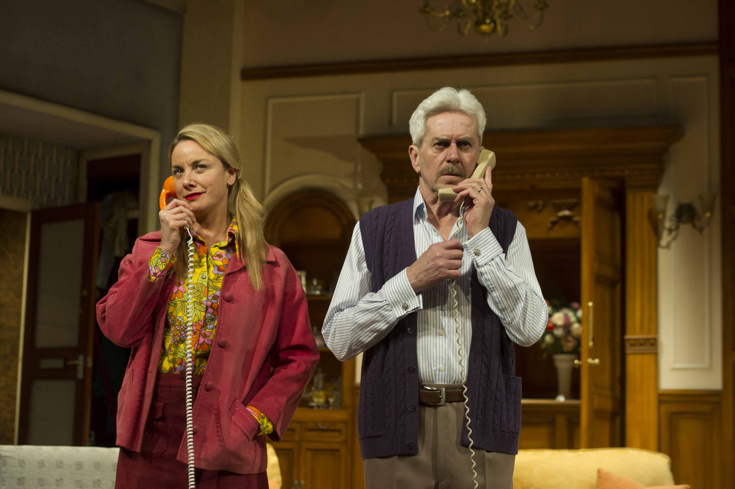Tamzin Outhwaite on Dark Truths, Chaotic Dinner Parties and Not Singing in London's How the Other Half Loves

(Photo: Alastair Muir)
Tamzin Outhwaite is a major TV name in Britain, where her West End credits include Di and Viv and Rose and the title role in Sweet Charity, but the actress is returning to her roots by co-starring in the revival at the Theatre Royal Haymarket, of the classic Alan Ayckbourn comedy How the Other Half Loves. The engaging performer took time prior to the start of previews to talk about growing older and not having to sing eight times a week.
You began your stage career with Ayckbourn, so how does it feel to return to this?
It was my first-ever play. I played Evelyn in Absent Friends and in the 20 years since I haven’t done an Ayckbourn play at all. So when I got the call about this, it felt right to be revisiting someone whose work had brought me so much joy. I don’t feel with Alan that I am out of turn in using the word “genius.” His stuff is extremely clever as well as being extremely real, and the comedy only comes from the realism and the truth of what’s actually going on—a truth that can sometimes get quite dark.
His structure, too, is amazing—in this very play, for instance.
Yes! How the Other Half Loves famously has a dinner party scene where geographically you’ve got one couple in two different places at two separate evenings but shown in the same theatrical time. It’s the most chaotic but also brilliantly written scene.
Tell us about your character of Teresa Phillips.
I think she’s a bright girl but she’s married to a man, Bob, who spends less and less time at home, so she feels very unappreciated and doesn’t leave the house much. As I see it, they were probably very much in love but they have had a baby who has probably ruined everything for them. I think everyone’s experienced at some point something that goes on between one of the three couples in the play.
Ayckbourn is pretty ruthless on the topic of marriage.
Very much so. [Co-star] Jason [Merrells] and I are pretty much continually at each other’s throats, and it feels at times as if it could get quite violent. Sometimes, you find yourself laughing and thinking, “that doesn’t feel right,” but if we haven’t got laughter, what else have we got? I’m not sure I want true darkness with no comedy.
Has doing this play affected your own view of dinner parties?
I actually love throwing dinner parties, but I don’t get much time to do them, and I think at the time this play was written [1969], dinner parties were a lot less relaxed than they are now. People are much more sociable nowadays.
Did you worry that the play might be dated?
Not in terms of the dialogue. The portrait of the relationships holds up in every way. The only way it might seem a period piece is through the clothing and the props. That’s where the clues are.
You were at the same theater six years ago starring in Sweet Charity, so this is quite a change.
It is, but there’s a lot to be said for just playing the scenes without breaking into song and dance. Funnily enough, when I first did Alan’s work 20 years ago I was desperately trying to be taken seriously as an actress and not just someone who could do what we call a twirly and a turn.
But you also love musicals?
I do. There’s something about a musical that has a buzz like nothing else, when you’re singing and dancing at the same time with a large chorus and harmonies that sound wonderful and you can see that what’s happening onstage is affecting the whole audience. The buzz you get from that is like no other.
For someone who came to attention on TV in EastEnders, why have you retained your devotion to the stage?
That’s because when we were at college, we didn’t train in TV or film; we trained to be onstage because that’s what you do. And it sounds cliché, I know, but going back to the theater feels like going home to me. It makes me scared—even terrified sometimes—but terrified in a very healthy way.
What about the States—do you feel the need to try and crack the American market?
I went out there a long time ago and got a great manager and did pilot season and stuff like that, but L.A. isn’t the place for a lady of my age. Since having children, life’s priorities change: schooling means that I’m quite tied to London at the moment, and I think as you get older, you spend less time being desperate to do things.
Any musicals you’re eyeing for the future?
Well, there’s a lot of Sondheim I would love to do but my ambition at this point isn’t really about doing this or that specific title but really to keep going—to me, that’s success.